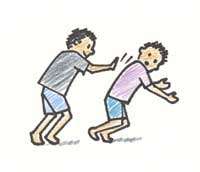How can coping skills help children deal with bullying?

Bullying is not only horrible to experience, but research shows it can have long-term detrimental effects on mental health. Both Zippy’s Friends and Apple’s Friends focus on bullying and try not only to reduce bullying in the classroom but also to give children coping skills to support them now and in the future.
What is bullying?
Children sometimes find it hard to distinguish bullying from occasional teasing and can start to label any negative comment, or even parental discipline as “bullying”
In our programmes we give the following definition.
“Bullying involves repeated nastiness to somebody, where a person or group deliberately targets someone with the intention of hurting them or making them feel bad. The abuse can be physical or emotional, and may involve name-calling or spreading nasty stories about somebody. If the abuse is done online, or via social media or phones it’s called cyber bullying”
If you are looking for more information on the difference between “rude”, “mean” and “bullying” this article by author Signe Whitson has some useful pointers.
Preventing bullying
The first step for schools should always be to prevent bullying. Zippy’s Friends and Apple’s Friends support this approach through encouraging kindness and empathy and discussing with children from a young age what bullying is. The rules about bullying in both programmes remind students not to bully and to ask for help if they experience bullying.
“Nobody has the right to bully other people”
“If we are bullied, we can ask for help from someone we trust”
Evaluations of Zippy’s Friends have found it actually reduces bullying compared to schools without the programme. In Norway, control schools (who didn’t run Zippy’s Friends) saw a small reduction in bullying over the course of the year. For schools that had run the programme the reduction was six times as high.
Coping with bullying
The coping skills taught in Zippy’s Friends and Apple’s Friends can also reduce the impact of bullying if it does occur. The long-term effect of bullying can be mitigated by how a child learns to cope with the situation.
There are two main ways to cope with any situation. One involves trying to change the situation. In this case, it may involve avoiding or stopping being bullied. Zippy’s Friends and Apple’s Friends with their focus on asking for help and communicating give tools to support this.
The second approach involves thinking differently about what happened and learning to deal with the emotional effects of the experience. Coping with situations by feeling differently about them can be very successful- for example, seeing the problem is in the bully or the school environment rather than themselves or learning to reduce feelings of anxiety rather than being consumed by them.
Both types of coping mechanisms are promoted and practised in Zippy’s Friends and Apple’s Friends giving children a wide repertoire of strategies to draw on both in class and in the years to come. Although Module 4 focusses on bullying, Modules 5 and 6 continue to promote and develop these useful coping strategies.
Helping the bullies
Finally it’s always worth remembering that bullies themselves are often unhappy and insecure and need better coping skills too. Universal programmes such as Zippy’s Friends and Apple’s Friends aim to give all children the tools they need.